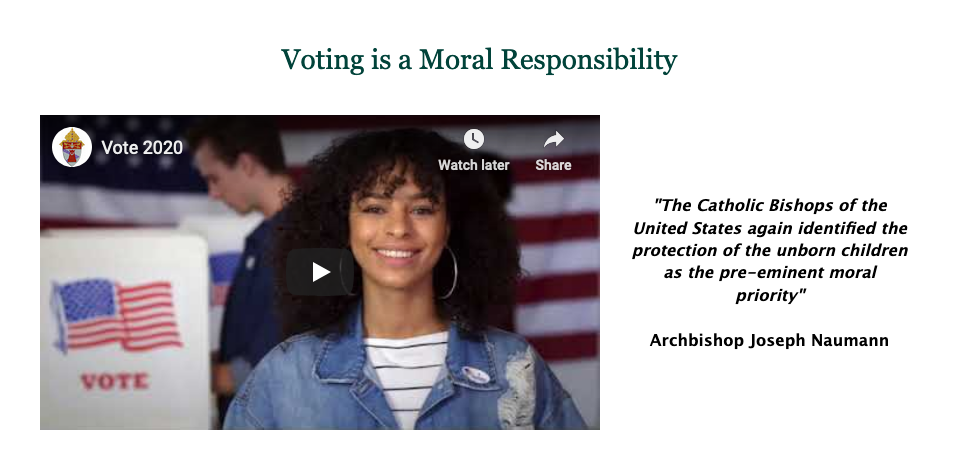
Dear Friends,
In a democratic society, an essential part of Christian discipleship is being a well formed and well informed voter. Being a well formed voter requires knowing the moral principles and priorities that should guide a Catholic’s evaluation and choice of candidates. Being a well-informed voter means knowing the positions of candidates on morally significant public policy issues. We have a responsibility to be engaged citizens who work actively for the common good. For the Catholic, voting is not just a good thing to do, but a moral responsibility. Many people have made heroic sacrifices to give us the freedoms we enjoy. We have a duty as Americans, Kansans and Catholics to take advantage of our right to vote.
Since the beginning of our nation, the Catholic Bishops have chosen not to endorse political candidates or parties. The Catholic Church does not tell its members for whom to vote. At the same time, it is the responsibility of the Church to help form the consciences of her members to understand the principles and priorities that should guide their decisions as voters. In the cover letter to Forming Consciences for Faithful Citizenship that was adopted last November by the full body of the United States Conference of Catholic Bishops, we reiterated that abortion remains a preeminent priority, echoing the emphasis that Pope St. John Paul gave to the abortion issue in the Gospel of Life. We offered three reasons why abortion remains a preeminent priority: 1) it attacks innocent life when it is most vulnerable and least able to defend itself, 2) it occurs within the family attacking the most fundamental human bonds of love, and 3) the magnitude of lives impacted – over 60 million abortions since 1973, almost 1 million annually, and on average more than 3,000 a day. This is an issue that a faithful Catholic cannot simply ignore.
At the same time, defending the sanctity of human life and the dignity of the human person includes much more than opposition to abortion. Upholding the Dignity of the Human Person encompasses a broad range of issues that include protecting the lives of the unborn, the disabled and the frail elderly, combatting racism, care for the refugee and immigrant, protecting religious liberty, defense and promotion of marriage, preferential option for the poor, rights of workers, access to health care, care for creation, combatting the Covid 19 virus, keeping communities safe, fostering an economy that provides employment opportunities, etc. While Catholics should care deeply about all of these issues, they are not morally equivalent. There are some that must be given priority, because they always involve intrinsic evil. For many issues, there are often morally valid though very different views on the most effective paths forward. Catholics may make different prudential judgments on how best to promote the common good and uphold the dignity of the human person. Public policies that allow the killing of children in the wombs of their mothers must be opposed and can never be justified. The mass murder of more than 60 million American children killed by abortion during the past 45 years is a moral tragedy of unimaginable proportions.
During meetings with Pope Francis this past January, the Holy Father reminded us that abortion is first and foremost a human rights issue. Pope Francis shared that in his conversations with supporters of legalized abortion, he asks two questions: 1) Is it ever right to kill a child to solve a problem? and 2) Is it ever right to hire someone to kill a child to solve a problem? The answers to Holy Father’s questions bring clarity to the moral gravity of each abortion. Tragically, the Kansas Supreme Court has claimed to have now discovered a right to abortion in the Kansas Constitution. To correct this grave injustice imposed by the Court, the Value Them Both Constitutional Amendment needs to be adopted by the citizens of Kansas. The Value Them Both Constitutional Amendment, while not prohibiting abortion, returns to the State Legislature the ability to enact laws that place restrictions on the abortion industry, protecting both mother and child. Passage of the Value Them Both Amendment requires affirmative votes by 2/3 of both the Kansas Senate and House of Representatives. Elections have consequences. Without super majorities in the Senate and the House, Kansan voters are unable to amend the Kansas Constitution to make it crystal clear that it does not contain a right to abortion.
In preparing to vote, we should ask the Holy Spirit to guide and inspire us to make wise and prudent choices in selecting our leaders. We must evaluate the positions and records of candidates on the many issues that concern us as Catholics and citizens. We must also judge the competence and character of candidates. There are no perfect candidates, just as there are no perfect voters. In a democratic republic, we choose those who will lead us.
Pray that we will choose wisely those we empower to govern us.
